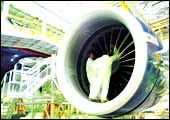 |
| Beautiful Gateway: The Welsh countryside
offers some stunning view for the business-weary executive |
Ever
since the 47-year-old Sirijiwan Singh packed his bags for his
new address in Wales in 2003 to head the pharmaceutical major,
Wockhardt UK Ltd-the new entity created after the acquisition
of cp Pharmaceuticals and Wallis Ltd by Wockhardt India-he has
never felt homesick. The soft-spoken managing director of the
biggest Indian company in Wales, who considers himself more of
a Briton than an Indian, attributes this to the fact that he has
"had no cause for complaint ever''. Neither from the government
(Welsh Assembly), nor from the bureaucracy. The Welsh workforce-which
constitutes more than 90 per cent of the total workforce of 360-is
cooperative, and even the weather is fine. "It has been a
wonderful experience,'' he smiles.
Singh singles out the Welsh Development Agency
(WDA)-funded by the Welsh government and committed to maintaining
Wales' status as a world-class location for overseas business-for
the biggest accolades for facilitating access to all relevant
government and private agencies, and sorting out his problems
from Day One. "This partnership (with the WDA) has been fruitful,''
he nods.
Ask him whether other Indian companies too
should follow Wockhardt's example and set up manufacturing bases
here, his answer is an unequivocal "yes''. But while it is
easy to get carried away by Singh's enthusiasm for all things
Welsh, it raises some pertinent questions. Why should any Indian
company, however strong it might be, invest millions in a little-known
"country within a country'' such as Wales? Or why should
any Indian entrepreneur, however enterprising, travel thousands
of kilometres to set up a manufacturing base or a service facility
in a tiny land that is just over 21,000 square kilometres with
a population of around three million?
 |
| Aerospace Advantage: Engineers check
an Airbus engine |
 |
| Magnificent Cardiff: Provides true life-work
balance |
 |
| High-tech Houses: Techniums are in vogue |
To tip the scale in its favour, Wales needs
to justify itself as a perfect business destination. And yes,
Wales scores over most European nations. It provides a gateway
to the UK, Europe and key markets around the world for Indian
products; an educated and dedicated workforce (25 per cent cheaper
than Germany, 60 per cent lower than the UK); a state-of-the-art
telecommunications network that provides broadband services to
more than 80 per cent of the population; a corporate tax of 30
per cent, which is one of the lowest in the European Union, and
competitive property prices.
There are financial incentives too for companies
seeking to set up manufacturing base-whether in manufacturing
or new technology areas such as biosciences, financial services,
software and digital media or even in call centres. The assistance
can come from the Welsh Assembly Government in the form of Regional
Selective Assistance and Assembly Investment Grant; from WDA in
terms of Property Development Grant and Finance Wales, among others.
No wonder then, more than 500 multinational
companies have already invested some $28 billion (Rs 1,23,200
crore) in their operations in Wales. Heading this list is the
EU (over 200 companies), closely followed by the us with more
than 180 companies and Japan with around 50 companies. "But
our biggest success lies in the fact that more than 60 per cent
of these companies have reinvested in their Wales facilities,''
contends Bob Hughes, Inward Investment Manager, WDA, who is in
charge of not only taking care of the existing businesses in North
Wales, but attracting new ones.
Wales' decision to go forth and woo the world
had as much to do with the necessities of a changing global order
as its need to keep its unemployment rate down. "The transformation
from an industrialised nation basically dealing in steel and coal
to one that is geared more towards a knowledge-based, high-technology
economy began after the Second World War with the realisation
that other countries had a competitive edge in the heavy industry
sector,'' says Peter Henley, Head (Advanced Manufacturing International
Services), WDA. Moreover, the decline in the traditional industries
meant the need to create alternative sources of employment.
 |
| Tomorrow's Labs: The buzzword |
So, leaving manufacturing in the safe hands
of Germany and Japan, Wales turned its attention towards consumer-focused
products such as white goods companies and entrenched players
in the automobiles and the aerospace industries. Thus while Sony,
one of the first Japanese multinationals to invest in Wales for
manufacturing cathode ray tubes for its television sets, may have
started rightsizing its Wales operation because of increased demand
for plasma and other high-end TVs, the automotive and aerospace
industries have continued to flourish. For instance, us giant,
Ford Motor Company, that produces engines for Volvo and the Land
Rover, is planning to invest nearly $360 million (Rs 1,584 crore)
to expand its operations here. Similarly, GE Aircraft Engine Services
at Cardiff and the Airbus facility in Broughton in North Wales
are pumping in millions of dollars to upgrade facilities in Wales.
While the former is preparing to welcome the gp-7000 engine that
is being inducted by commercial airlines next year, the latter
too is getting ready to manufacture wings for the still-to-be
launched A350 passenger jets.
Similarly, the $5.8 billion (Rs 25,520 crore)
electronics industry too has caught the imagination of Welsh authorities.
The industry employs over 30,000 people and has attracted more
than $5 billion (Rs 22,000 crore) of investments in 25 years.
THE WELSH EXPERIENCE
Pharma major Wockhardt's acquisition spree
in the UK has paid rich dividends. |
 |
| Wockhardt Chairman Habil Khorakiwala:
Leading the foray |
For Wockhardt UK, a subsidiary
of the Indian pharmaceutical major Wockhardt Ltd, Wales has
been a happy hunting ground. Beginning with its first acquisition
of Wallis Laboratory in 1998, an over-the-counter pharmaceutical
company based in Luton for £2.5 million (Rs 17 crore
then), it went on to acquire CP Pharmaceuticals, a Wales-based
company, for £23 million (Rs 177 crore then) in June
2003. And it is still thirsting for more.
And for Sirijiwan Singh, Managing Director, Wockhardt
UK, the inorganic route to growth has paid rich dividends.
It helped the company gain a foothold in the lucrative European
pharmaceutical market and added a whole set of drugs to
its existing portfolio with significant potential. These
include the Hypurin range of animal insulins, Hylase (a
drug used for ophthalmic surgery) and Multiparin range of
Heparins.
"But significantly, we were able to add a lot of
value to these acquisitions and create an identity of our
own,'' contends Singh, who was part of Wockhardt's acquisition
team for both Wallis and CP Pharmaceuticals. "By restructuring
Wallis, Wockhardt UK were able to move a lot of low-cost
drugs such as paracetamol and ibuprofen to India, thereby
drastically reducing costs,'' adds Singh.
While Wallis gave Wockhardt UK an entry into the UK retail
chain business because its medicines were being sold over
the counter in retail shops such as Tesco and ASDA, the
acquisition of CP Pharmaceutical gave it a foothold in the
hospital sector, the generics market and in contract manufacturing
(producing drugs for large manufacturing companies). After
all, CP Pharmaceuticals already has 230 market-authorised
drugs in the market and another 50 in the pipeline.
Today, a satisfied Singh says that the company has managed
to increase the turnover of CP Pharmaceuticals from £34
million (Rs 261.8 crore)-when it took over-to nearly £54
million (Rs 448.2 crore) in 2004 and expects to cross the
£58 million (Rs 458.2 crore) turnover-mark by 2005-end.
And that too when the company has right sized its staff
from 570 to 360 employees.
And that's not all. After acquiring Esparma GmbH, a German
pharmaceutical company in 2004, Wockhardt UK moved all its
products to its manufacturing unit in Wrexham in North Wales.
These include a number of branded creams and liquids, mainly
used for treating wounds. "It wouldn't have made sense
to manufacture the products in India, because shipping them
back to Europe would be an expensive proposition,'' adds
Singh.
So, for Singh making the Wrexham plant the manufacturing
hub of Europe is the most important issue today. No wonder
then, the company is investing huge amounts in improving
the facilities. It has already invested £3.5 million
(Rs 28.35 crore) in the last two years to improve the facility-basically
changing the old machinery for new ones. "Next year
we will invest around £1.5 million (Rs 11.85 crore)
to bring in new machines such as high-speed inspection machines
and adding new machines for sterile products to give a new
impetus to the flourishing contract manufacturing activities,''
adds Singh.
|
But it is the optoelectronics industry that
has occupied the pride of place in Wales. Today, North Wales boasts
of biggies such as Thales, Alcatel and Cogent Defence Systems.
Thus, while nurturing the well-entrenched
players, the Welsh government is also investing huge sums to develop
its knowledge-based industries. While it has recently announced
a whopping £6-million (Rs 47.4-crore) investment in nanotechnology
research, the best example of knowledge-based industries gaining
ground is the nine Technium Initiatives (see box).
Take the case of Technium Digital, located
in the heart of Swansea University campus. Set up in partnership
with Swansea University and the WDA with the support of the Welsh
government, EU, Sony, Agilent Technologies and IBM, it is an ideal
location for start-ups seeking to make commercial success in high
performance computation, sophisticated next-generation optical
and wireless communication systems. Says David Shultz, Manager
of Applications and Support, NCCS: "Technium is an ideal
facility for what we have to do. It would have been very cost
prohibitive to try and establish an office of the same quality
on our own.''
FROM THE CRUCIBLE TO THE GLOBAL STAGE
For knowledge-based start-ups, Techniums
provide a one-stop answer for all their needs. |
 |
| Swansea Technium: Turning big
ideas into big business |
From a distance, the optic
(Opto-Electronics Technology & Incubation Centre) Technium
at St Asaph Business Park in North Wales looks rather imposing.
On one side of the building are just rows and rows of solar
panels that light up the entire building-7,700 square kilometres
of floor space with an incubation centre of 24 units, a
technology centre with clean room facilities for innovative
products and a business centre, which includes conference
facilities.
The OpTIC Technium, among the nine others in Wales, are
basically incubator houses for start-up companies-firms
that have brilliant ideas, but need some hand holding before
their products can become marketing successes. And it is
here that the Techniums step in by providing them with the
necessary funds through meetings with venture capitalists.
They also provide support services including technology,
academic expertise and help them market these products,
even get patents. And for all these services, the management
only charges them a nominal rent.
For instance, the OpTIC Technium, managed by Optropreuers
Ltd, a private sector company supported by the Welsh Development
Agency and the Welsh Optro-electronics Forum, provides a
three-phase power supply, water supply, compressed air and
air conditioning along with broadband facilities. As Steve
Davis, Director, Technium, points out: "Venture capitalists
are willing to fund anywhere between £0.5 million
and £2 million (Rs 3.95-15.8 crore) depending on the
project.'' And it is also easy to get VCs to come to these
Techniums because they can get to meet 20 to 30 start-ups
at one time.
Today, there are as many as nine Techniums catering to
hi-tech areas such as software, digital media, biosciences,
and opto-electronics, and the government plans to have 13
such specialised ones by 2007. So to qualify as a tenant
in one of these Techniums, the start-ups need to have a
unique idea or a new or expanding high-tech or knowledge-based
business.
However, the rules of the Techniums are clear. Help is
only provided to start-ups and unless these companies are
able to successfully market their products within four to
five years, they are asked to pack up. "Not all start-ups
are going to succeed and that's the risk we have to take,''
adds Davis. After all, the basic idea behind the Techniums
is to create high value jobs (for graduates and above).
And there are enough success stories of start-ups as there
are failures. Davis cites the example of Ensis, a one-man
start-up that successfully created a solid light emitting
diode for the treatment of "port wine stains'' (something
that treats marks like the one former Soviet Union President
Mikhail Gorbachev had on his face). Today, the company employs
as many as 25 people. "Clearly, these are the kind
of success stories that we like,'' says Davis.
Thus for knowledge-based start-ups, help is at hand. Techniums
will help them reach full potential quickly and efficiently,
building their business on best practices and firm foundation.
|
For Steve Davis, Technium Director at Cyfarwyddwr
Technium at Swansea, the focus is not merely to pick out start-ups
with innovative ideas. "The main focus, after all, is always
on creating high value jobs in Wales,'' he says.
Other areas that have caught the fancy of
the Welsh government are the biosciences and the digital media
industry. Biosciences, or more particularly stem cell research,
today is one of the most important areas of research in Wales.
The reason, as Christopher Davis, Sector Manager (Biotechnology),
WDA, explains is because the UK has the most sensible regulatory
mechanism in the world. "Every kind of stem cell research
needs prior licensing from the government, unlike in the us where
only state-funded institutions need licensing from the government.
Hence, all research is monitored,'' he adds.
Further, there are a host of VCS ready to
pour money. No wonder, Wales has developed a lot of clusters such
as those in Technium Cast, Bangor Bioscience Incubator in the
University of Wales and others where 250 companies are at work.
The leading companies include GE Healthcare, Provalis and Merck
Chemicals Ltd.
So, if you are an Indian company looking
to expand your business in the fields of aerospace, automotive,
biotech, pharmaceuticals, opto-electronics, semiconductors, medical
technologies or software and digital media, just head straight
for Wales. Not only will you come across a talented, friendly
and hardworking workforce, but a great location with excellent
infrastructure providing easy access to the vast European market.
You will find a willing partner in the WDA, also ready to lend
a hand in finding the right home and school for your kids. Call
it the Welsh hospitality.
SPREADING ITS WINGS
The aerospace industry is thriving in
Wales. |
 |
| Enginers @Airbus: Aircraft maintenance
is big business in Wales |
Wales seems like a strange
address for biggies in aerospace industry to land. Consider:
the region has just 20,764 square kilometres, housing over
three million, and no national airlines to boast off. Still,
Raytheon and GE Aircraft Engine Services, and Airbus and
Nordam jostle for space with some 145 other aerospace and
related companies that employ 27,000 people. "The aerospace
industry is one of the largest employers in this region,''
contends Roger Thompson, Director (Strategic Investor Programme),
Welsh Development Agency (WDA), in charge of the aerospace
and automotive sector.
And fortunately enough, this industry is alive and kicking,
despite being rocked by the September 11, 2001 devastation,
the SARS outbreak in China and East Asia in 2003, and the
more recent bombings in London and elsewhere. The Airbus
facility in Broughton in North Wales, for instance, is getting
ready to manufacture wings for the still-to-be launched
A350 passenger jets, while its 6,500-odd workers remain
busy manufacturing wings for all the Airbus aircraft, including
the latest entrant, the Airbus A380 passenger jet.
Similarly, the state-of-the art GE Aircraft Engine Services
facility at Cardiff too is preparing to welcome the GP-7000
engine that is being inducted by commercial airlines next
year, as well as the A340 engine. GE, which took over the
Cardiff facility from British Airways (BA) in 1992, does
all the maintenance work for Boeing's 777 engine, Rolls
Royce's 787 engine, and all aircraft of Ryan Air and Easy
Jet at its No. 4 Test Centre that has been upgraded for
a cool $40 million (Rs 176 crore).
For Andrew Reid, Operations Manager at GE Aircraft Engine
Services, who joined from BA, it has been a "superb
experience'' working in the Cardiff facility with its skilled
and dedicated staff ever vigilant about customers' needs.
Today with around 800 technicians and engineers in tow,
Reid is confident his order books are only going to grow
as more and more airlines induct new aircraft to meet the
growing demand from domestic and international travellers,
and the increasing incidence of low-cost carriers outsourcing
their maintenance jobs.
So what can the WDA do to stop aerospace companies relocating
to cheaper destinations? For Thompson, the answer is simple.
"To be continuously on the ball,'' he adds. In other
words, to be aware of all the new projects going on in the
aviation industry and ensure that these new projects (developments)
remain in Wales and thereby ensure that high-value jobs
continue to be created here. And if that means daily discussions
with the companies to ascertain their needs, establishing
new aerospace parks, getting in new component manufacturers
to set up shop to help the existing players, and ensuring
that there is a steady source of skilled persons, so be
it. It will do this and much, much more. For instance, the
WDA is already developing a new aerospace park in association
with the Defence Aviation Repair Agency at St Athan, just
outside Cardiff, to meet the growing needs. And it promises
to do much more to keep these companies here.
|
|











